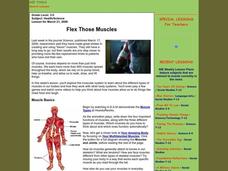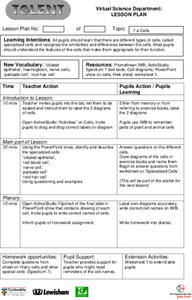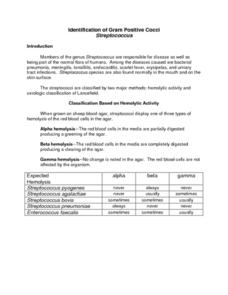Curated OER
"Who Done It?" Analysis of Molecular Fingerprints Left At the Scene of the Crime
Learners examine different types of DNA fragments. They record and analyze their results. They determine who is the criminal in the story.
Curated OER
Vital Vitamins
Students study vitamins and who should take them and what ones to take. In this investigative lesson students plan a healthy diet after reviewing the types of supplements.
Curated OER
Flex Those Muscles
Students explore the muscular system to examine the different types of muscles in our bodies and how they work with other body systems. They discover how muscles help us chew food and laugh. Videos are used as part of this lesson.
Curated OER
Magnetic Discovery Bottle
Students examine how to conduct simple investigations and use simple equipment to gather data. For this magnet lesson students decide what types of objects are attracted to magnets.
Curated OER
Baleen Whales vs. Toothed Whales
Second graders review mammal characteristics and study two types of whales. In this mammal study lesson, 2nd graders discuss mammals and define their five characteristics. Students complete a whale worksheet and define differences...
Curated OER
Amphibians Crossword Puzzle
In this biology worksheet, students complete a crossword puzzle with 24 questions about different types of amphibians and functions of their body parts.
Curated OER
Worm Interviews
Students identify types of worms. In this organisms lesson, students are shown slides of the different types of worms and take notes on each worm. Students answer questions about each worm.
Curated OER
Valves and Pumps - A Demonstration
Learners see how valves and pumps work in concert to move blood through the circulatory system.
Curated OER
Use of Microscopes and Creation of Slides
Students explore the use of microscopes and the creation of slides. They practice using, adjusting and viewing with a microscope. they view slides of familiar substances such as blood and fibers. In addition, they create slides using...
Curated OER
Animal Classification
Pupils watch video and slide shows as an introduction to animals. They discuss classifications of animals while moving from most common to least common of the animals. Types of classifications includes herbivores/carnivores;...
Curated OER
Cells
Students explore the types of cells and their appropriate function. After observing a PowerPoint presentation, students draw diagrams of cells. Using a specified website, students identify parts of plant and animal cells. They answer...
Curated OER
Mrs. Moore's Question-Circulatory System
Fifth graders explore the circulatory system. Using the internet, and their textbook, they research the heart and blood flow through the body. Students use MicroSoft Word to complete a written letter which summarizes information about...
Curated OER
Inside the Cell
For this science worksheet, students study the structure and function of the cell by reading the information, studying the pictures and diagrams and finally completing a challenging crossword puzzle. There are 84 pages available.
Curated OER
Marvelous Mammals- Non-Fiction Reading Comprehension Worksheets
In this mammals non-fiction reading comprehension activity, 3rd graders read a one page selection about the characteristics of mammals. They answer 10 questions based on the reading including true and false, short answer, and multiple...
Curated OER
Preventing Hypothermia
Students identify the causes of hypothermia. In this biology lesson, students investigate the different types of heat transfer and heat loss. They discuss several practical measures to avoid hypothermia.
Curated OER
Murder Mystery
High schoolers examine how to capture foot prints while they simulate a criminal investigation. They discover how the clues are needed for identifying or eliminating murder suspects.
Curated OER
Different Types of Orange Juice Contain the Same Amounts of Vitamin C?
High schoolers measure and compare the amount of vitamin C in orange juice samples. They discover the effects of different factors on the concentration of vitamin C. They participate in an experiment to test the orange juice.
American Museum of Natural History
What's This? Leeches
Who actually likes leeches? Meet a scientist that makes his living letting leeches feed on him. Pupils learn about the characteristics of leeches and different variations of the species. The lesson works as a remote learning resource or...
Curated OER
Identification of Positive Streptococci
After being introduced to the genus Straptococcus, biology buffs set up agar plates, esculin slants, and salt broth tubes with different species to test. The level of laboratory skills required to perform this activity makes it most...
Curated OER
Health Physics: The Effects of Radiation on Living Things
A mix of scientific details and background information about the well-known sites of radiation attacks or accidents. This topic may open up details that you may consider as sensitive, and could be upsetting to some pupils. This is a...
Curated OER
Neuron Cookie
Find out just how enticing learning about neurons can be by creating models with sugar cookies, icing, and candy. With great background information for you and an easy procedure for the kids, studying cells has never been more fun or...
Curated OER
Help the Duck Find Her Babies
Students are introduced to a basic characteristic and need of living things-the ability and need to reproduce. They investigate how birds (and people) attract mates. Students discover how to build a nest. They discuss the needs and...
Curated OER
Anatomy of a Bone - Coloring
Clarify and color code the anatomy of a bone with this resource. This worksheet lists 7 parts of a bone along with a definition for each part. Learners read through this information and color in each part of the bone a listed color. They...
Curated OER
Recombination and Pedigrees
Biology aces answer four questions about genetic recombination and nine questions about pedigrees. This worksheet is very focused on these two topics. Most of the pedigree questions relate to the genetic disorders, Alkaptonuria and...























